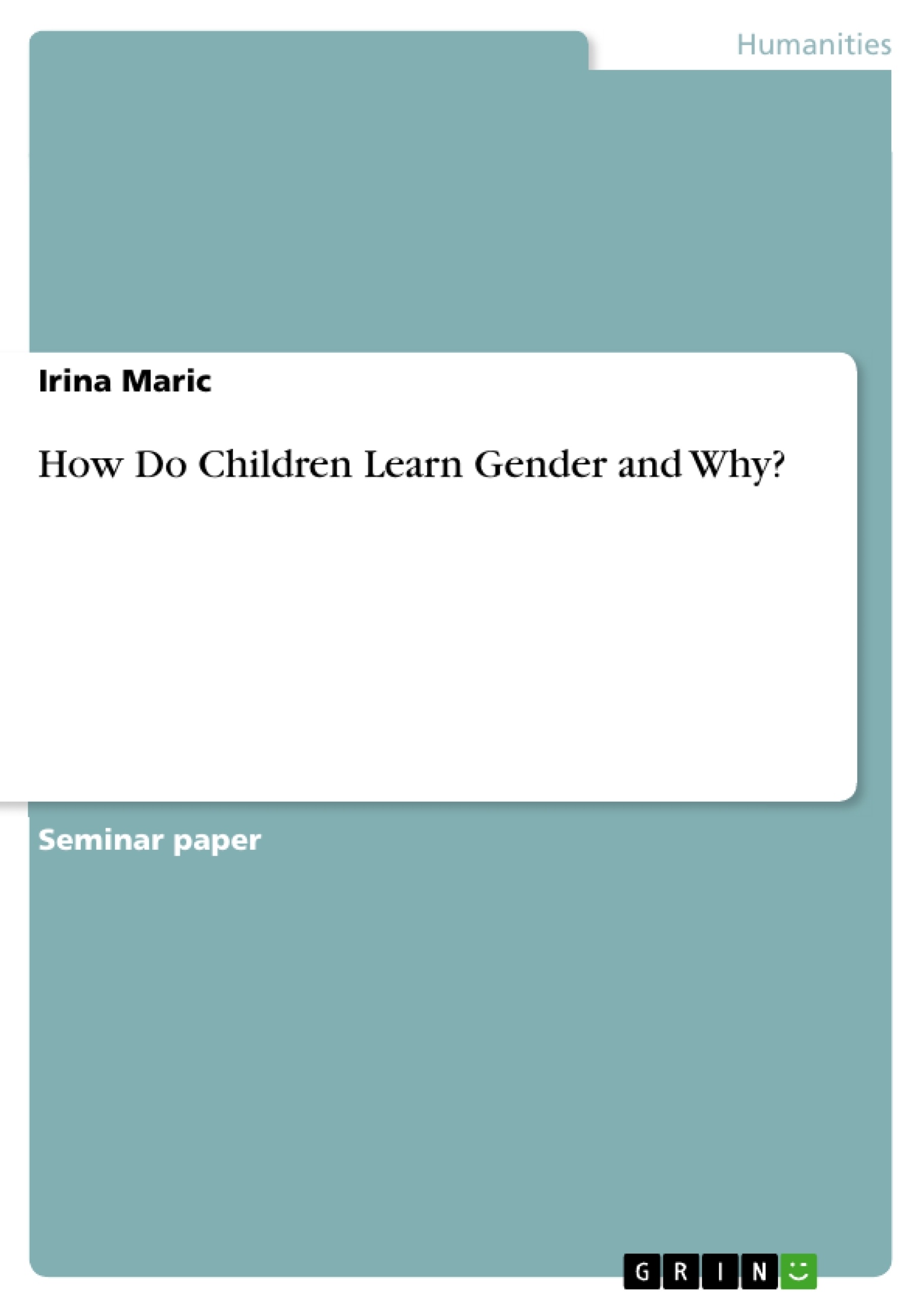he aim of this paper is to critically discuss the hypothesis that children learn gender behaviour and if this is true, when and why do they do so. In order to do so, first of all it is necessary to define the terminology used in this paper. In a second step we need to evaluate the present findings with the view to finding out if there are other approaches to the topic. The following paper will therefore present the standpoints of different researchers, display both contrasts and similarities and try to find arguments supporting or opposing the findings.
From my point of view, both genetics and socialisation are responsible for the gender behaviour, which can be observed in even very young children. „Gender‟, in contrast to sex, is a term, which is investigated at the social, sociological level, but used interchangeably with „sex‟, which in Western cultures is used in dichotomous categories: male and female. „Sex‟ is commonly understood as a biological, genetic concept which is stable over time, whereas gender is seen as dynamic, shifting, having multiple versions. In general it can be described as the sense of oneself as man or woman and it reinforces the differences between men and women. However, there is no real agreement on the definition of gender so far. Later on, we will put this concept into perspective by introducing further categories of sex and gender.
Inhaltsverzeichnis (Table of Contents)
- INTRODUCTION
- VARIOUS APPROACHES TO THE CONCEPT OF GENDER
- ESSENTIALIST AND CONSTRUCTIONIST APPROACHES TO SEX AND GENDER
- THE NATURE - NURTURE DEBATE
- Biological accounts of gender differences
- Genetic and evolutionary accounts
- Freud and the Psychoanalysis
- The Role of Socialisation
- Cross-cultural Comparisons
- Sex-differentiated Responses to Girls and Boys
- Social-learning Theory
- Gender Behaviour and Language
- CONCLUSION
Zielsetzung und Themenschwerpunkte (Objectives and Key Themes)
This paper aims to critically analyze the hypothesis that children learn gender behavior, examining when and why this occurs. The work explores diverse perspectives on the concept of gender, comparing and contrasting different theories and arguments.
- The definition and conceptualization of gender
- The nature-nurture debate in relation to gender behavior
- The influence of biological factors on gender differences
- The role of social construction and socialization in shaping gender identities
- The impact of cultural variations on gender expression
Zusammenfassung der Kapitel (Chapter Summaries)
The first chapter introduces the topic and the research question, outlining the paper's objective and key concepts. It explores the definitions of sex and gender, highlighting the distinctions and complexities surrounding them. The second chapter delves into various approaches to understanding gender, contrasting essentialist and constructionist perspectives. It also examines the nature-nurture debate, exploring the role of biological factors like genetics and hormones in shaping gender behavior. Finally, this chapter analyzes the influence of social factors, including socialization, cross-cultural comparisons, and social learning theory.
Schlüsselwörter (Keywords)
Key concepts explored in this paper include: gender, sex, essentialism, constructionism, nature-nurture debate, biological accounts, socialization, gender behavior, cross-cultural comparisons, social learning theory, and intersex.
Frequently Asked Questions
What is the difference between 'sex' and 'gender'?
'Sex' is generally understood as a biological, genetic concept that is stable over time, while 'gender' is viewed as a social and dynamic construct representing how individuals identify as male or female.
How do children learn gender behavior?
Children acquire gender behavior through a combination of biological factors (nature) and socialization processes (nurture), including social learning and cultural influences.
What is the constructionist approach to gender?
The constructionist approach argues that gender is not an innate quality but is built through social interactions, language, and cultural norms.
What role does socialization play in gender identity?
Socialization involves how parents, peers, and society respond differently to boys and girls, reinforcing specific behaviors and expectations that shape their sense of man- or womanhood.
Are there biological reasons for gender differences?
Essentialist theories suggest that biological factors, such as genetics and hormones, predetermine certain behavioral differences between the sexes.
- Arbeit zitieren
- M.A. Irina Maric (Autor:in), 2010, How Do Children Learn Gender and Why?, München, GRIN Verlag, https://www.hausarbeiten.de/document/205976


